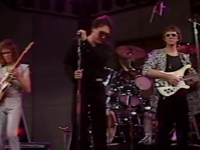One of the many benefits of doing a song by song examination of Yes’ studio output is that it has allowed me to reevaluate and rediscover great albums and songs. Some albums have actually moved down on my list (wait until we get to Big Generator) while a few such as the already-reviewed Tormato have fared better.
Drama is clearly in the former category, yet still presents an enigma: Drama is easily one of the best Yes albums! Drama is my second favorite Yes album. It has great progressive elements with pop sensibilities, some of the most aggressive guitar playing provided by Steve Howe and best bass playing by Chris Squire and compact yet innovative synthesizer playing by Geoff Downes.
What the album doesn’t have is Jon Anderson. Even now, there are a group of head-in-the-sand Yes fans who believe the world is flat and that the progressive rock universe revolves around Anderson. Yes, Jon Anderson was involved with more than a few of the greatest progressive rock albums of all time, and has remained relevant. (Anderson/Stolt’s Invention on Knowledge proves he still got it.) But Anderson’s been out of Yes for more than a decade, and the band has issued two more album studio albums since his unusual departure (firing). Of the three total studio alums Yes has made without Jon Anderson one was great, one was good and one was just OK.
Drama was the great one, but it failed to produce any charting singles and – as a No. 18 Billboard hit – was the lowest charting Yes album in years. “Into the Lens” may not have been the best pick as a single. Perhaps “Tempus Fugit,” the final song, should have been the focus track.
This is a gem among gems, based on the Alan White/Chris Squire/Steve Howe jam and built up with Fairlight synthesizer, more synths, Hammond organ and piano by Geoff Downes. Downes also brings in his vocoder for Yes’ chant, which is a nice, new wave pop element.
This album presents some of the more prominent Alan White performances, which says a lot given his more than four-decade history with the world’s greatest progressive rock band. On “Tempus Fugit,” his high hat and tom-tom work propels the song with a frantic urgency that is matched by Trevor Horn. Horn is great throughout Drama and occasionally brilliant. “Tempus Fugit” finds Horn at his best, writing lyrics which are frantic as the White back beat. Furthermore, Horn’s vocals are perfectly matched with Chris Squire.
Chris Squire and Steve Howe vie for the most valuable player crown for “Tempus Fugit.” Howe’s distorted and phased Fender Stratocaster is fanatic, threatening to run off the rails yet is perfectly cast in the song. Squire’s Rickenbacker bass is just as prominent, as he uses slight distortion and reverb while running up and down the fretboard – then occasionally dancing around the root notes.
One of the benefits of not having Jon Anderson in Yes is that “Tempus Fugit” has been played on a bunch of more recent tours, and promises to be on the upcoming Like It Is live album, which is currently in post-production with Billy Sherwood at the knobs.
I often wonder how Yes would have moved forward if Horn had elected to stay in Yes, but then we would probably never have the band Asia (which would feature both Howe and Downes), or the biggest hit in Yes’ canon – the album we examine next, 90125.
- Nosotros, “Mentiras” (2024): One Track Mind - April 10, 2024
- Nick Finzer, Christian Fabian, Rachel Z + Others: Five for the Road - April 5, 2024
- Terry Blade on ‘Ethos: Son of a Sharecropper’: Something Else! Interview - March 10, 2024



